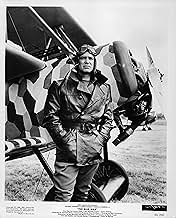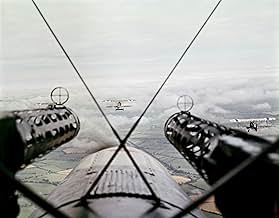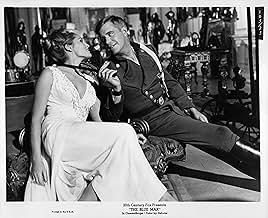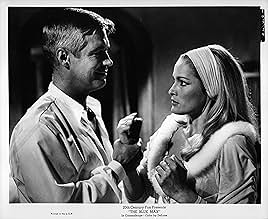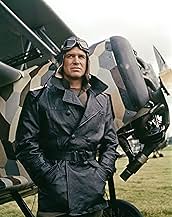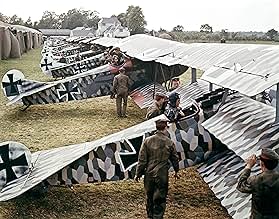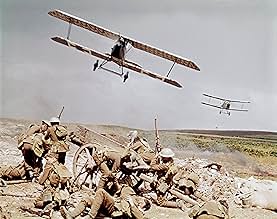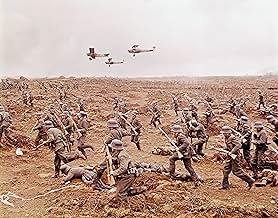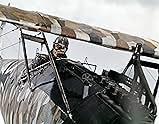Un joven piloto de las fuerzas aéreas alemanas de 1918, mal visto por ser de clase baja y poco caballeroso, intenta ambiciosamente ganar la medalla ofrecida por 20 bajas.Un joven piloto de las fuerzas aéreas alemanas de 1918, mal visto por ser de clase baja y poco caballeroso, intenta ambiciosamente ganar la medalla ofrecida por 20 bajas.Un joven piloto de las fuerzas aéreas alemanas de 1918, mal visto por ser de clase baja y poco caballeroso, intenta ambiciosamente ganar la medalla ofrecida por 20 bajas.
- Dirección
- Guionistas
- Elenco
- Ganó 1 premio BAFTA
- 1 premio ganado y 5 nominaciones en total
- Elfi Heidemann
- (as Loni Von Friedl)
- Feldmarschall von Lenndorf
- (as Friedrich Ledebur)
Opiniones destacadas
Unmistakably one of the most entertaining war films to come out of the 1960s, "The Blue Max" is the kind of film that could only have been made in Hollywood. Featuring some of the best aerial combat scenes ever shot and a great ensemble cast, it's enjoyable pulp fantasy for any war film fan.
The film opens with a brilliant, intense action sequence: Bruno Stachel (George Peppard, "Tobruk") dives into a mud-filled crater on the Western Front. He's visibly exhausted; his heavy breathing and unshaven face reveal how horrible front line conditions are. From above comes the sound of a dogfight Peppard's bright blue eyes blare from a mud-covered face as he stares in awe at the action in the skies above him, the mood fully established with Jerry Goldsmith's evocative score. Flash forward two years: Stachel has transferred to the Luftwaffe and is a green, inexperienced pilot. A peasant, Stachel has little in common with his high-class comrades, members of the elite Officer Corps. He's ruthless and ambitious, and sets his sight on winning a Blue Max the medal awarded to a pilot with 20 kills to his credit. With this award, Bruno will have won the respect of his comrades. Squadron commander Heidemann (Karl Michael Vogler, "Patton") has one, and hotshot Willi von Klugermann (Jeremy Kemp, "Operation Crossbow") is awarded one early in the film. Stachel vigorously has to catch up to their status, and Willi takes a liking to him, helping him try to fit in.
As Germany is losing the war, Willi's uncle, General von Klugermann (James Mason, "Cross of Iron") enters the stage: he sees potential in Stachel for more than just flying prowess. This is a time when the common people of Germany need a hero. Stachel is a poor farm boy, someone they can all relate to. Von Klugermann sets out to make Stachel a national icon; when he received a minor wound, he's escorted to a cushy Berlin hotel and the press takes pictures of a nurse tending to his wound, plastering pictures all over the national newspapers. Countess Kaeti von Klugermann (the beautiful Ursula Andress) sets her sights on Stachel, and soon a steamy affair has begun, right under the nose of the General. As Stachel's selfish ambitions become more apparent and blatant, Willi's friendly competitiveness fades and their adversity becomes an all-out battle. All of this builds to an unavoidable, somewhat depressing ending.
This is a character-driven drama firstly, and the action is simply a supplement to the story of the characters. Unfortunately, Peppard is a wooden lead. He speaks in unaccented English and never seems to be thoroughly involved in his part; it's as though he's sleepwalking through almost every scene. The rest of the cast deserves more credit. Co-star Jeremy Kemp is much more believable. He's sly, cynical and delivers fantastic deadpan humor. James Mason is brilliant as usual as General von Klugermann, a career German officer whose chief concern is for the German people and his nation's prestige. I have never seen Mason deliver a bad performance, and here he is simply fantastic. He's often cool and restrained, but lets anger and rage come out full-force at key moments. As his unfaithful wife, Ursula Andress is her typical self; beautiful and often barely concealed. A standout is Karl Michael Vogler as Heidemann. A veteran flyer devoted to his duty, Heidemann is a career soldier. He's been fighting since the beginning of the war, and although weary and tired, keeps doing his job. His chief goals are keeping as many planes flying as possible, despite Allied air attacks and supply shortages. He demands that Stachel's ambitions take second fiddle to strategic operations; when he disobeys orders, Heidemann threatens to have him court-martialed. Vogler's performance is excellent, and he walks away with each of his scenes.
Director John Guillermin and Director-of-Photography Douglas Slocombe weave some excellent flying sequences into the film's story. These action scenes are not independent conflicts between German and English fighters conflicts between characters are developed on the ground and either expanded or settled in the air. The skies have never been bluer, and the vintage aircraft look fantastic as they dive, swoop and strafe enemy columns. The stunt work and special effects are genuine, even some brilliantly-staged crash sequences. Even the work of Guy Hamilton and crew in 1969's "Battle of Britain" pales in comparison to this. The scenes of trench warfare and bombing runs are massive and spectacular. The mud-splattered soldiers, vast fields dotted with rotting corpses and bomb craters, and some hand-to-hand combat has never looked more authentic. Every cent invested in the film was put to good use. Scenes in Berlin particularly that in the hospital and food riots shot through a moving car window are historically accurate.
Guillermin isn't afraid to experiment with the camera during the discussion scenes. Note how he often places two actors in one room on opposite ends of the frame, simply to capture the scope of the interiors. Marvelous pans show off huge numbers of extras and planes taking off and landing. There's also a long crane shot showing a huge, lavish dining hall at the Von Klugermann's mansion which captures the essence of nobility and aristocracy in one shot.
"The Blue Max" is a brilliantly shot, engaging and wildly entertaining World War I epic which should satisfy any fan of aircraft and war films. This is a must-see DVD, which preserves the CinemaScope ratio (a necessary asset, as pan-and-scan versions detract from the epic look of the picture) and also features a great restored surround-sound track and stunning digital image quality. It's the only acceptable way to see this film in the modern world.
This movie tells the story of Bruno Stachel, an ordinary infantry soldier who has been turned into a fighter pilot. His colleagues aren't happy with him, not only because he isn't an aristocrat like they are, but also because he's extremely ambitious. He will do anything to win him his country's most honored medal, the Blue Max. But to win it, he'll have to shoot down 20 enemy aircrafts, which will all have to be confirmed by his comrades, without getting killed himself. And while being hated by his fellow pilots, he's seen as the people's hero and perfect propaganda material by the general and as the ideal lust object by the general's wife...
"The Blue Max" shows very well how the pilots during WWI were almost always noblemen (I guess the most famous one of them all was Manfred Freiherr von Richthofen, better known as the Red Barron), who considered the concept of an honorable death at the hands of a "worthy" opponent still as one of the most important things during their fights. Even at the end of the war in 1918, while on the ground troops had been anonymously slaughtered by the thousands with machine guns and gas, they still considered chivalry as one of the highest goods.
Next to the historically correct situation of the story, I also admire the rest of the movie. I know, if you aren't interested in WWI, than this might not be the most spectacular movie you've ever seen, but even than the movie has plenty of good and interesting things to offer. The story on itself is nice, the acting is very good and the airplanes are magnificent to watch, on the ground as well as in the air. This is one of those movies that has stood the hands of time, but that is known by only a small audience, which is really a shame. Personally I'm a big fan of this movie and that's why I reward it with an 8/10. My advice: don't call "Top Gun" the ultimate fighter pilot movie before you've seen this one.
Overall, Blue Max has moments of greatness and moments of boredom. A must see for war film fans, in any case.
Big-budget extended adventures produced by Elmo Williams about a maverick pilot and his partners undergoing risked feats on air and bombing on earth . Based on a novel by Jack Hunter and being well adapted by Franchina and Ben Barzman . Very good aerial actioner plenty action , steamy romance , drama , fantastic cloudy scenes and spectacular dogfighting . George Peppard shows professionalism as crack fighter pilot named Stachel , an ambitious youth assigned to dangerous missions . Top-notch support cast gives excellent performance as Jeremy Kemp as astute contender , Anton Diffring , Derren Nesbitt , Peter Woodthorpe , Loni Von Friedl and Carl Schell as Von Richthofen , the famous Red Baron . Rousing aerial scenes staged by Squire , being wonderfully photographed by Douglas Slocombe and marvelous musical score by the great Jerry Goldsmith are the chief assets of this spectacular film . This lavish airplane movie is professionally directed by John Guillermin , habitual of disaster films ( Skyjacked , King Kong , Kong lives ) , adventures ( Tarzan in India , Tarzan's greatest adventure , Sheena ) , Wartime ( Bridge of Remangen , Guns at Batasi , I was Monty's double ) and intrigue ( Death on the Nile , Shaft in Africa , The whole truth ) . John Guillermin usually worked with George Peppard in various films ( such as P.J , House of cards and Blue Max) and Peter Sellers (Never let go , Walz of the Toreadors) . 'Blue Max' is a rehash of the former airplane movie clichés in which the splendid casting stands out . Rating : Good and entertaining , it's a fairly watchable and breathtaking film and results to be a good treatment of WWI flying aces .
I saw this movie with my father in 1966. He always loved the bi-planes of World War I and they thrill me to this day.
The title, though central to the theme of the movie is really a misnomer to the enjoyment of this film. You actually get to see r-e-a-l aircraft in combat without the cartoon effects of CGI.
This is movie making in the school of the other Cinamascope greats: Somewhat weak on plot, but so absolutely cool in visual execution, that you overlook the script's lack of depth.
I'm not saying that this movie doesn't have a plot. It's a solid story with somewhat shallow character development. But in the end, the characters were secondary to a story of bravery, early air war history and tactics and the wearing away of chivalry in an era of a nation fighting for survival in the end of hours.
Acting was good, direction was fine and choreography using actual aircraft was among the last of it's kind.
I give this an 8 out of 10 for displaying concrete reality in an era of cartoon gimmicks.
¿Sabías que…?
- TriviaFox wasn't able to rent any of he surviving WWI planes still extant, so they built their own. The aircraft were later used in "Darling Lily" and "You Can't Win Them All."
- ErroresThe German award called the "Pour le Mérite" (a.k.a. the Blue Max) was awarded at the beginning of the war to pilots who shot down 8 enemy aircraft; that was later raised to 16. The requirement was never 20 as depicted here.
- Citas
Willi von Klugermann: By the way, Stachel... there's an impression around that... you care more about your unconfirmed kill than you do about Fabian's death.
[long pause]
Bruno Stachel: Perhaps it's force of habit. In the trenches, we couldn't even bury the dead; there were too many of them. I've never had the time... to discuss them over a glass of champagne.
- Versiones alternativasIt is believed that this film was at one time released in a 70 mm version (because of its six channel soundtrack), but this has never been confirmed.
- ConexionesFeatured in The Amazing Howard Hughes (1977)
- Bandas sonorasDeutschlandlied
(uncredited)
Music by Joseph Haydn
Lyrics by August Heinrich Hoffman von Fallersleben
Played at Stachel's medal presentation
Selecciones populares
- How long is The Blue Max?Con tecnología de Alexa
Detalles
Taquilla
- Presupuesto
- USD 5,000,000 (estimado)
- Tiempo de ejecución2 horas 36 minutos
- Color
- Mezcla de sonido
- Relación de aspecto
- 2.35 : 1
Contribuir a esta página



